Key takeaways:
- Recipe documentation serves as a personal narrative that enhances culinary skills and builds confidence through reflection on cooking experiences.
- Maintaining a documentation system—whether through notebooks or apps—facilitates organization, efficiency, and captures the emotional journey of cooking.
- Evaluating recipe outcomes and embracing failures as learning opportunities fosters growth and creativity in cooking.
- Sharing documented recipes invites community engagement and connection, transforming individual cooking stories into collective culinary experiences.
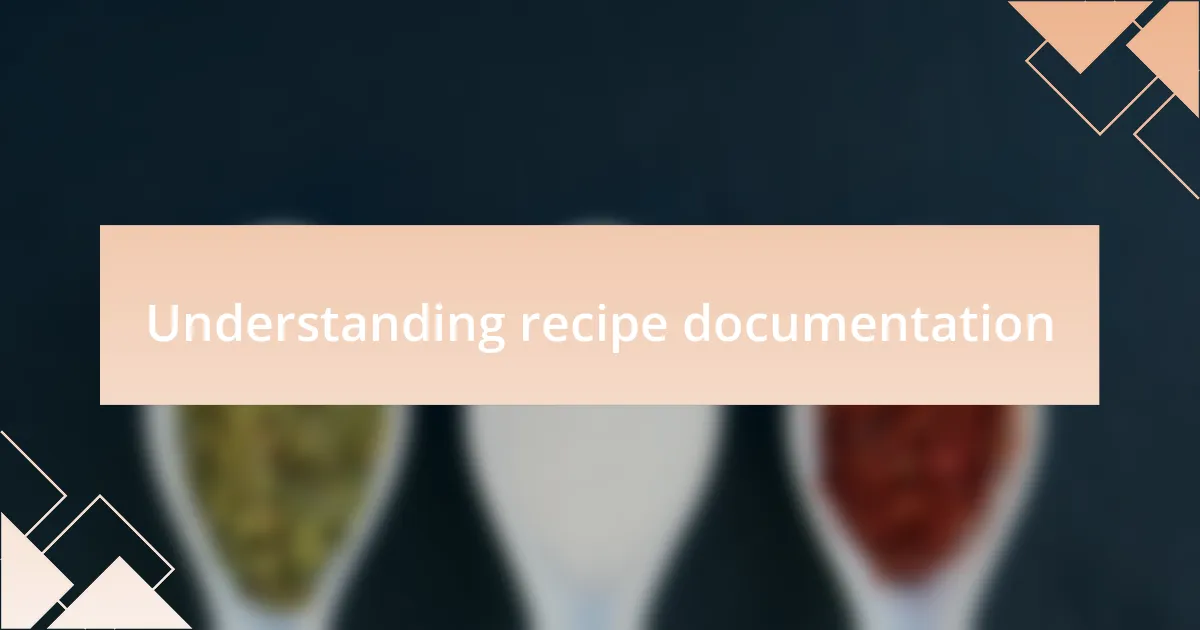
Understanding recipe documentation
Recipe documentation is more than just a list of ingredients; it’s a narrative that unfolds with each step. Reflecting on my own experiences, I recall the time I meticulously documented a family recipe for sourdough bread. It wasn’t just about noting the measurements; I captured the nuances of the process, the smells, and even the sense of achievement that came with each loaf.
Have you ever felt the joy of revisiting a cherished recipe and realizing how your technique has evolved? I often find that my notes serve as a bridge between my past kitchen experiments and where I am now. By documenting not only what I did but also what I learned along the way, I create a personal reference that enriches my culinary journey.
The act of documenting my recipes allows me to refine my skills and build confidence as a cook. Each notation acts like a time capsule of my culinary exploration, sparking memories and insights that may have otherwise faded. Isn’t it fascinating how a simple note can transform a routine into a heartfelt legacy?
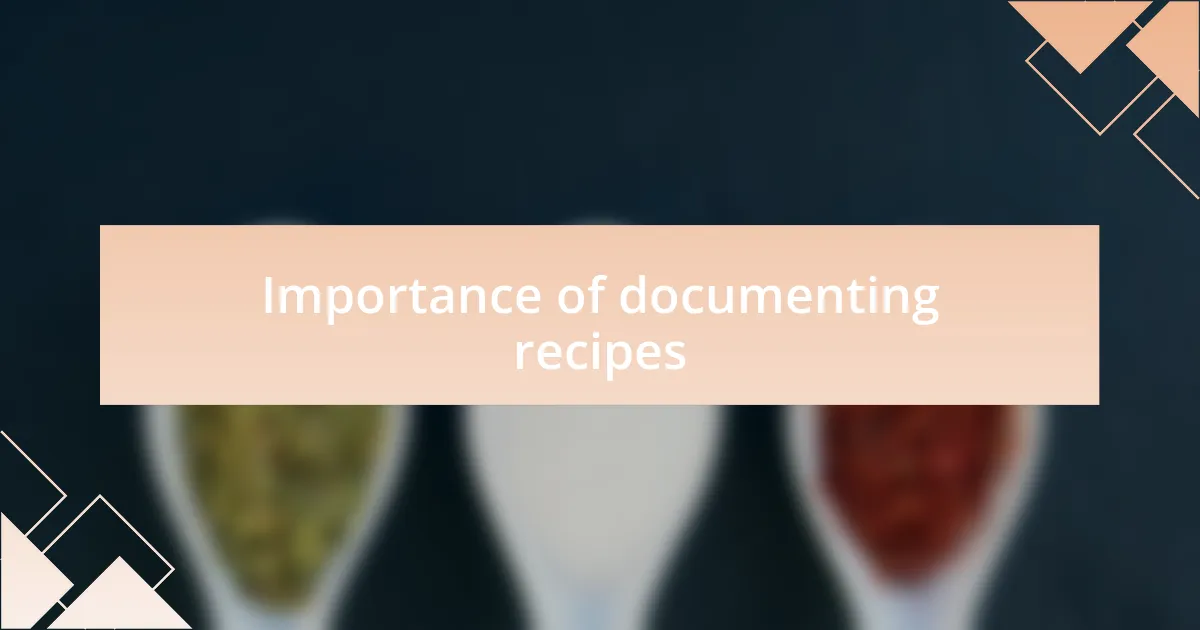
Importance of documenting recipes
Documenting recipes is crucial for capturing the subtleties that make each dish unique. I remember one time I attempted a classic marinara sauce; my first try was too bland, but as I recorded my adjustments, I discovered the power of using fresh basil instead of dried. Each tweak became an essential part of my culinary growth, showcasing not just what I cooked, but how I learned to listen to my ingredients.
Have you considered how recipe documentation can serve as a personal historical record? I often find myself flipping through old notes, and each page vividly brings back kitchen moments—the laughter shared with a friend while rolling gyoza or the frustration of a failed soufflé. Those memories are invaluable; they remind me that cooking is not solely about the final dish, but about the journey, the learning, and the connections made along the way.
Moreover, the process of documenting helps build a sense of accountability. When I reflect on a recipe, it encourages me to experiment further, pushing boundaries and trying new techniques. Isn’t it rewarding to challenge yourself to improve each time? My notes motivate me to embrace mistakes as stepping stones, ensuring that my culinary story keeps evolving.
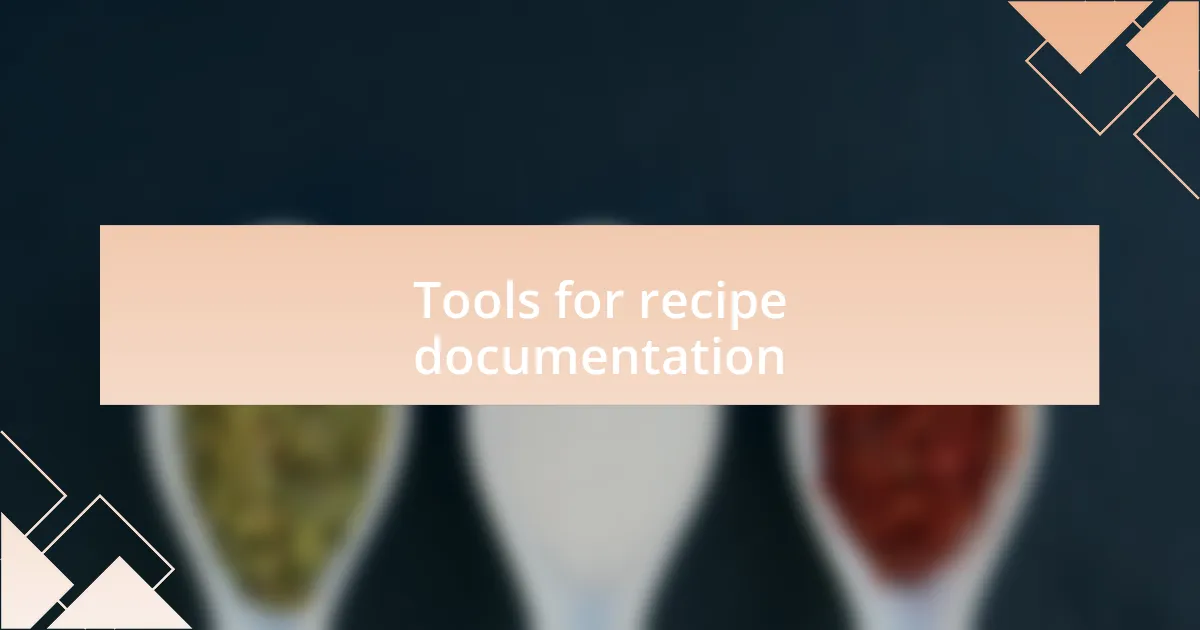
Tools for recipe documentation
When it comes to tools for recipe documentation, I swear by a few essentials that enhance my culinary journey. A simple notebook has always been my go-to; it’s where I jot down insights and modifications as I cook. I find that writing by hand helps me connect more deeply with the food I’m preparing. Have you tried keeping a dedicated space for your thoughts? There’s something about seeing your progress unfold on paper that feels incredibly rewarding.
For a digital approach, I’ve recently started using a recipe management app, which manages my growing collection neatly. With the app, I can easily search for specific recipes, categorize them by cuisine, and even share them with friends. Have you ever found yourself hunting through countless scraps of paper for a recipe? This tool has certainly simplified that process for me, turning chaotic notes into a well-organized library of flavors and techniques.
Photographs have also become an integral part of my documentation process. I snap pictures of my culinary creations, capturing not just the finished product but the stages of preparation as well. Looking back at those images brings back the smells and tastes, almost like opening a time capsule of flavor. Isn’t it fascinating how a single photo can not only document a recipe but also evoke memories and emotions tied to that dish? This blend of visual and written documentation truly enriches my cooking experience.
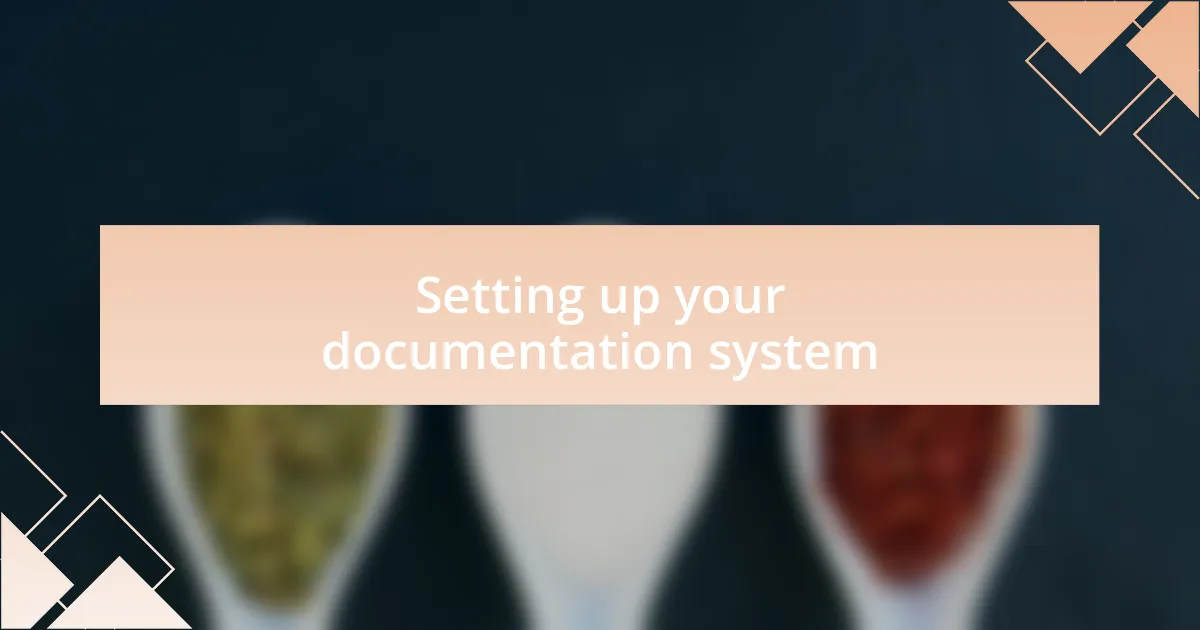
Setting up your documentation system
Setting up a documentation system for my recipes starts with understanding what works best for me. I’ve experimented with various formats, from spiral-bound notebooks to digital spreadsheets. The moment I decided to categorize my recipes by ingredient and cooking method was a breakthrough; it felt like I was building my own culinary library. Have you ever thought about how organizing your recipes can make you a more efficient cook?
As I further refined my system, I realized that consistency is key. Every recipe I document follows a similar format: ingredients listed first, followed by steps, and notes on modifications or tips. This uniformity allows me to quickly glance through my entries and immediately find what I need. I can’t tell you how often I’ve rushed into the kitchen and remembered a great twist I wanted to try but couldn’t recall the details. What if you could avoid that moment of confusion?
Lastly, I love incorporating notes on my emotional journey while cooking. I jot down how a particular dish made me feel or what memories it stirred up. Recently, as I documented a family recipe, I was transported back to my grandmother’s kitchen, where we spent countless afternoons together. Capturing these moments not only spices up my documentation but enriches my connection to the food. Isn’t it amazing how a recipe can go beyond just ingredients and transform into a tapestry of experiences?
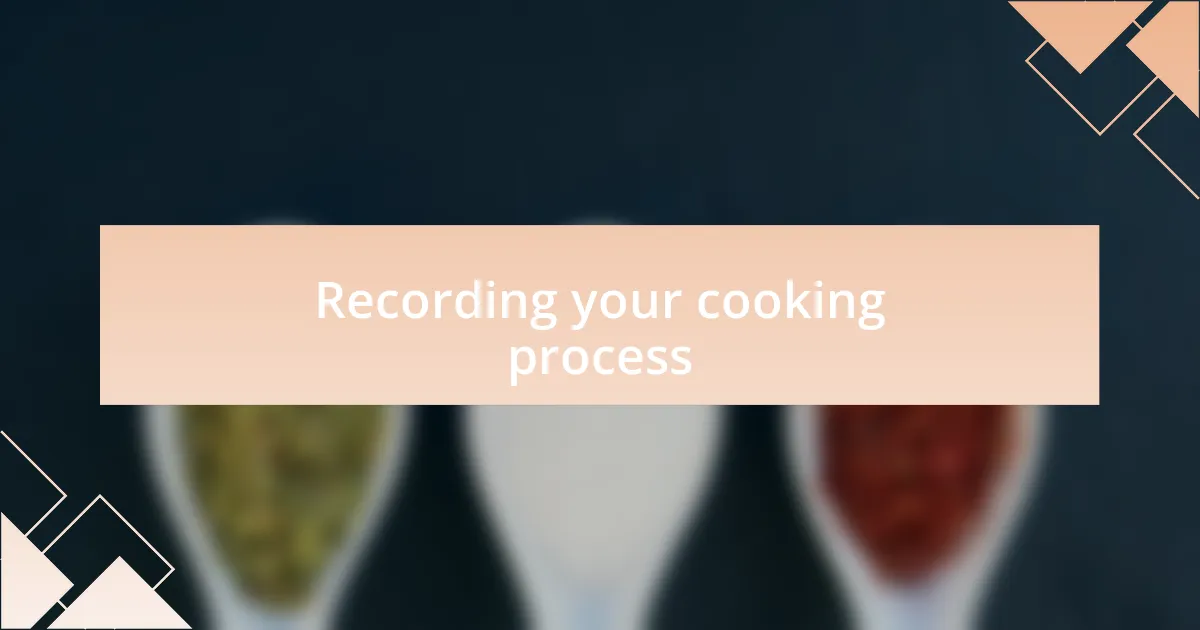
Recording your cooking process
Recording your cooking process is where the magic truly happens. I often use a combination of photographs and written notes to capture each step. Recently, while making pasta from scratch, I snapped pictures of the dough’s texture at different stages. This not only helped me remember the process later but also gave me a visual guide to compare against my future attempts. How often have you struggled to recreate something perfectly because you couldn’t remember the visuals?
Taking time to annotate your experiences while cooking can make a huge difference. I remember preparing a spicy chili that didn’t turn out quite right initially. My notes reflected the adjustments I made—a pinch more salt here, an extra hour of simmering there. By recording my trials and errors, I’ve built a roadmap that guides my future cooking endeavors. It’s fascinating how these small tweaks can lead to big improvements, isn’t it?
Moreover, I try to review my recordings regularly. This reflection helps me identify patterns in my cooking that I might want to change or maintain. For instance, I realized certain techniques yield better flavor, and now I prioritize those in my cooking. I encourage you to revisit your recordings; they hold the key to your culinary growth. Have you looked back at your own notes lately? You might be surprised by what you’ve forgotten and what you’ve accomplished.
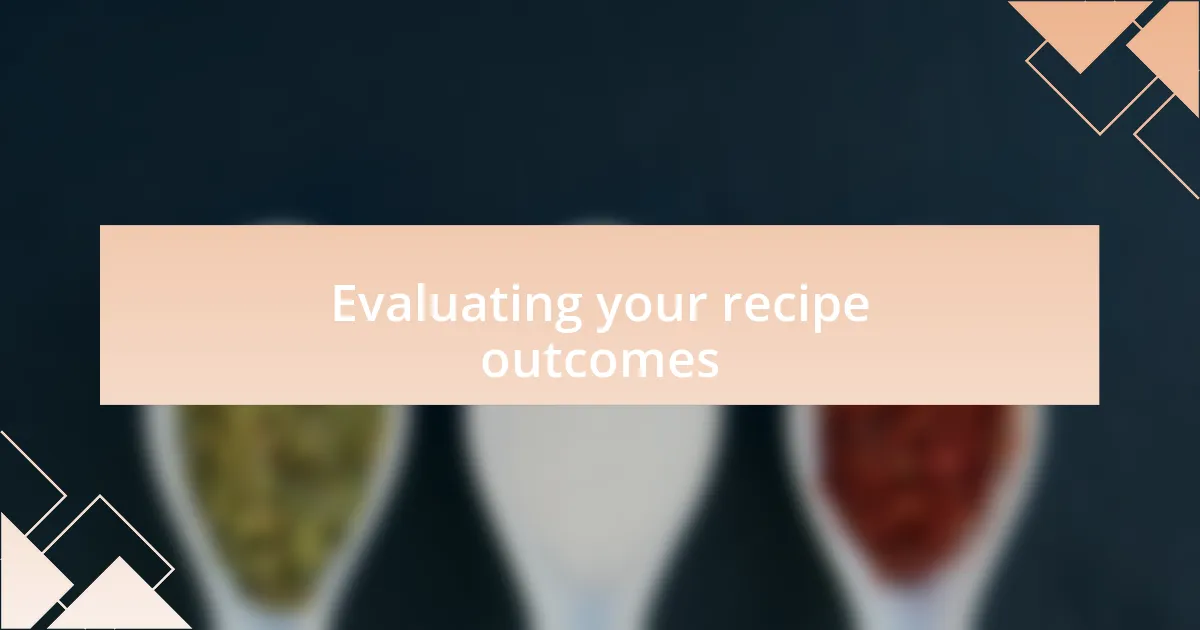
Evaluating your recipe outcomes
Evaluating the outcomes of your recipes is an essential step in growing as a cook. I often find myself reminiscing about a spectacular chicken curry I made a few weeks ago. After enjoying the dish, I jotted down what worked well—the spice balance and cooking time—while noting areas for improvement, like the need for a bit more acidity to brighten the flavors. This process of dissecting my outcomes has transformed my cooking.
There are moments of joy and revelation when I evaluate my results. I can vividly recall the time I attempted a complex soufflé. It collapsed spectacularly, but instead of feeling defeated, I learned to examine where things went awry. Was it the egg whites not being whipped enough, or perhaps an oven temperature miscalculation? Each misstep is a lesson, inviting me to adapt and try again, which I find empowering. Have you ever felt that spark of creativity ignited by a failure?
Reflecting on these outcomes regularly allows me to track my culinary evolution. I’ve noticed that my ability to critique a dish improves over time, helping me create more consistently delicious meals. For instance, my pasta-making adventures have shown me that every batch has its unique quirks. Embracing these differences, rather than expecting perfection, has become a cornerstone of my culinary journey. What discoveries are waiting for you in your own recipe evaluations?
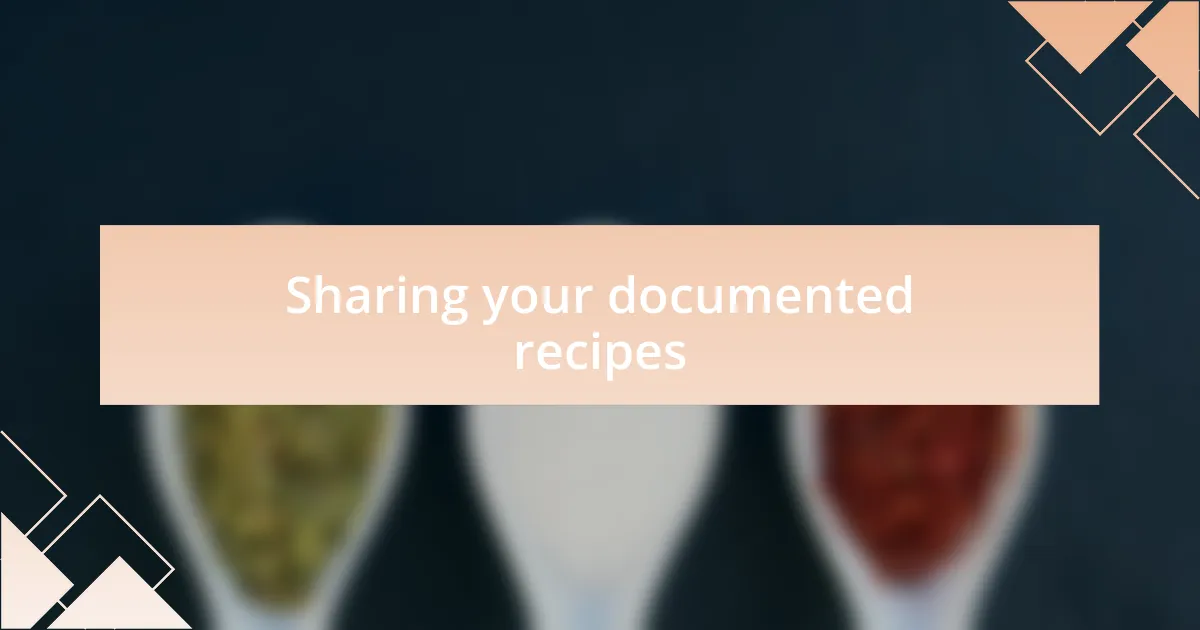
Sharing your documented recipes
Sharing my documented recipes has always felt like opening a window into my culinary world. I remember when I first shared my grandmother’s classic apple pie recipe on my blog; the feedback was overwhelming. People not only tried the recipe but also began sharing their twists and personal stories about family traditions. It’s quite rewarding to see how a simple dish can resonate and connect us all.
When I showcase my recipes online, I don’t just list ingredients and steps; I include the emotion behind the cooking process. For instance, while writing about my spicy chili, I explained how it warms my heart during winter gatherings. Sharing these personal touches sparks conversations and invites others to share their experiences. Don’t you think a recipe is more than just instructions? It becomes a story that unites us through flavors and memories.
Encouraging interaction is vital. I often ask readers to share their variations or challenges they faced while trying my recipes. Just last week, someone reached out with tips on adjusting the spice level in my curry recipe, which inspired me to revisit my own technique. This back-and-forth not only enriches my cooking journey but creates a community of passionate foodies. How have your recipe-sharing experiences enhanced your culinary adventures?